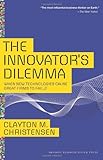In the colloquial sense, most workers jobs' get disrupted by garden variety financial innovation anyway. It doesn't really matter whether your job can be done by machine, the PE firm or corporate finance types will just lay you off, leave your job undone, and boost margins so they can unload the stock before customers realize they're not getting anything for their money.
[1] https://www.amazon.com/Innovators-Dilemma-Technologies-Manag...
Basically, as a former Intel employee, Intel is ripe for being disrupted. (The employees only want to follow the rules and believe the rules will last forever.) Why it hasn't been disrupted yet, is a bit harder to explain.
The book can be found on Amazon here: https://www.amazon.co.uk/Innovators-Dilemma-Technologies-Man...
The Innovator's Dilemma [1] is something that Steve Jobs seemed to have solved. How? Selling one product that cannibalizes sales of another from the same company was A-OK on his watch.
The iPod Mini was a perfectly fine device, yet Apple introduced the iPod Nano at the height of the Mini's popularity. The Nano had less storage [2], but it had solid state flash memory, and therefore was thinner yet.
How'd that work out for Apple? Just fine [3] - they kept about 80% marketshare for the entire life of dedicated digital music players in the market, and that market only went away when Apple brought out a phone so good that it made carrying a dedicated digital music player unnecessary.
Competing with themselves is a key piece in Apple's sustained success in a few markets. The iPhone 8 / X matchup shows they continue to not be afraid to do that with their phone, and I think that's a very healthy thing for their continued success... which also feeds into continued success of their ecosystem, including app developers (like myself!).
[1] https://www.amazon.com/Innovators-Dilemma-Technologies-Manag...
[2] https://everymac.com/systems/apple/ipod/ipod-faq/differences...
https://www.amazon.com/Innovators-Dilemma-Technologies-Manag...
Back in the 1970s you had a lot of people in the U.S. who fought in WWII or were Jewish or Polish or Italian or who otherwise would refuse to buy Japanese or German cars. They would buy American cars no matter how bad they were.
So American cars got really bad.
One of the most popular topics on HN is handwringing about what Mac laptop they want to buy. This model is underpowered, this one is expensive, that one has too few ports, etc. They might be happier if they bought a Dell, but they think of that like they think of putting a hand in their toilet.
So long as people buy Apple products on the basis of how they make them feel about themselves, they have no reason to make improvements in Siri.
The best thing you can do to make Siri better is vote with your feet.
Ten years from now, any car maker that isn't building an EV will be considered insane. Ten years ago, it was Musk that was considered insane for wanting to sell an EV. It requires strong leadership, vision and commitment to move to the "new paradigm", even if that is "the future", which probably isn't very obvious at all at the time.
Look at solar panels, too. Same thing. Just 5 years ago they cost 4x more. You can see how people would consider you crazy for wanting to go into the solar panel business 5 or 10 years ago, when some of the leaders in the business now entered the market.
If you haven't read it already, I strongly suggest reading The Innovator's Dilemma. It will give you more insight into why this sort of stuff keeps happening:
http://www.amazon.com/Innovators-Dilemma-Technologies-Cause-...
That said, I highly recommend The Innovator's Dilemma[0] and Inspired: How to Create Products Customers Love[1]
[0]: http://www.amazon.com/The-Innovators-Dilemma-Technologies-Ma... [1]: http://www.amazon.com/Inspired-Create-Products-Customers-Lov...

May I suggest the book "The Innovators Dilemma". Sometimes people who don't understand the problem manage to solve it in a much better way.
https://www.amazon.com/Innovators-Dilemma-Technologies-Manag...